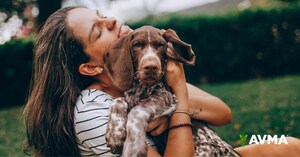Top Pet Doctor Shares Tips to Steer Clear of Animal-Borne Diseases this Summer
SCHAUMBURG, Ill., July 26, 2021 /PRNewswire/ -- It's state fair season across the country. In addition to the food and games local fairs have to offer, livestock shows and petting zoos are always popular attractions. According to veterinarians, it's important for people to know that some animal-borne diseases can be transmitted from farm animals to people and pets. Those attending state fairs and petting zoos should be aware of the health risks, and preventive measures you can take to be safe when petting and feeding animals at these and other fun venues.
Dr. Douglas Kratt, President of the American Veterinary Medical Association (AVMA) says, "It's always good to take precautions when you're in close proximity with animals because they and their environments can transfer germs that can make you or someone in your family ill."
Examples of zoonotic diseases—those that spread from animals to people--include Salmonella, E. coli, campylobacter, Lyme disease, West Nile Virus, and rabies. Just like with colds and flu, if germs get on your hands and you inadvertently put your hands in your mouth or nose, you could get sick. The most common symptoms one could experience are vomiting, fever, diarrhea, and cramps. And, while most people recover without a visit to the doctor, some may need a doctor's visit or hospitalization.
Dr. Kratt offers these tips to help you, your family and your four-legged friends stay safe when you've been around zoo or farm animals:
- Don't eat or drink near areas that house animals.
- Park strollers outside animal barns and pens, so as not to transfer germs to the wheels and take them home with you.
- Use hand sanitizer when you can, which should be readily available these days, especially if there's no soap and hot water accessible.
- After you're done with the fun, wash your hands thoroughly with soap and water, even if you didn't touch an animal directly. Keep an eye on children to make sure they wash their hands thoroughly.
- While there is little evidence that animals can spread COVID-19 to people, in some situations it can spread from people to animals. People suspected or confirmed positive should avoid contact with pets, livestock, and wildlife.
For more valuable information about pets and pet care visit www.avma.org. The AVMA is one of the largest veterinary medical organizations in the world, with more than 97,000 members dedicated to the art and science of veterinary medicine.
SOURCE American Veterinary Medical Association

Related Links
WANT YOUR COMPANY'S NEWS FEATURED ON PRNEWSWIRE.COM?
Newsrooms &
Influencers
Digital Media
Outlets
Journalists
Opted In






Share this article